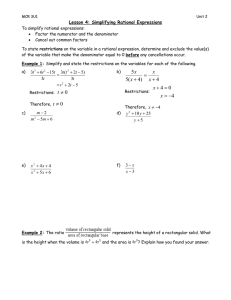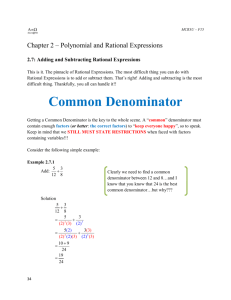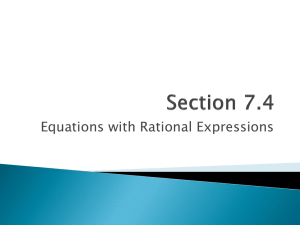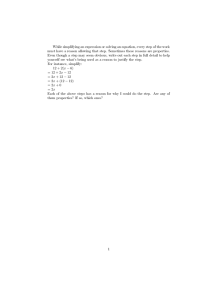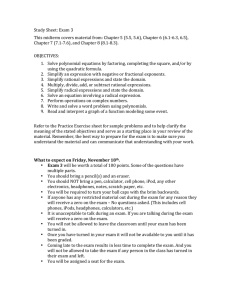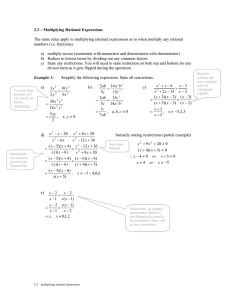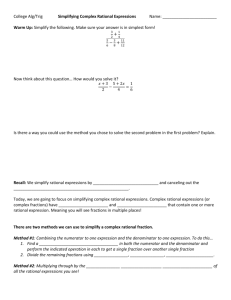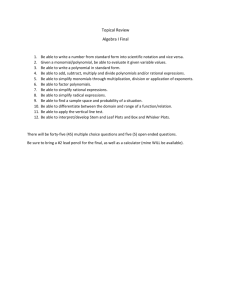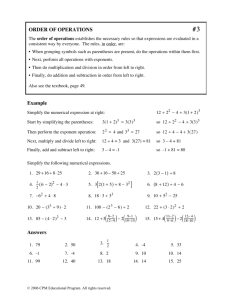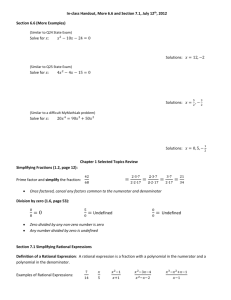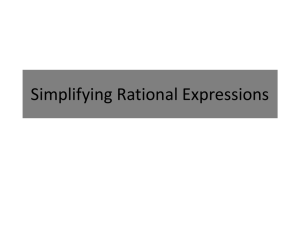2.2 – Simplifying Rational Expressions
advertisement
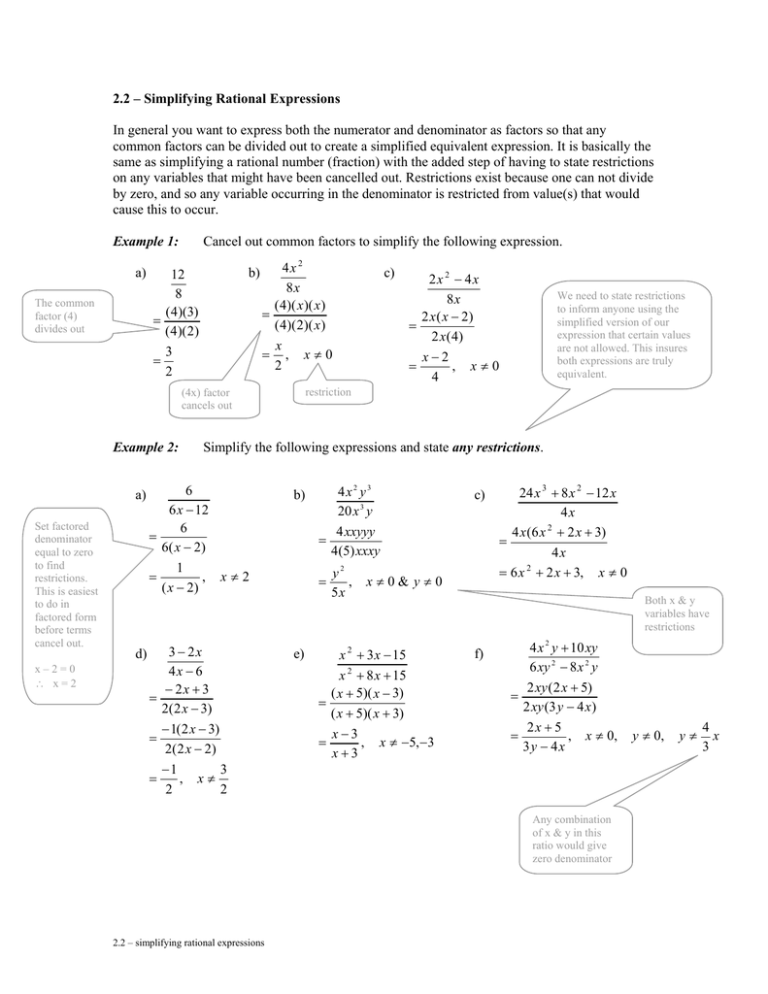
2.2 – Simplifying Rational Expressions In general you want to express both the numerator and denominator as factors so that any common factors can be divided out to create a simplified equivalent expression. It is basically the same as simplifying a rational number (fraction) with the added step of having to state restrictions on any variables that might have been cancelled out. Restrictions exist because one can not divide by zero, and so any variable occurring in the denominator is restricted from value(s) that would cause this to occur. Example 1: a) The common factor (4) divides out Cancel out common factors to simplify the following expression. b) 12 8 ( 4)(3) = ( 4)( 2) 3 = 2 4x 2 8x ( 4)( x )( x ) = ( 4)( 2)( x ) x = , x≠0 2 a) Set factored denominator equal to zero to find restrictions. This is easiest to do in factored form before terms cancel out. x–2=0 ∴ x=2 d) 2x 2 − 4x 8x 2 x ( x − 2) = 2 x ( 4) x−2 = , x≠0 4 We need to state restrictions to inform anyone using the simplified version of our expression that certain values are not allowed. This insures both expressions are truly equivalent. restriction (4x) factor cancels out Example 2: c) Simplify the following expressions and state any restrictions. 6 6 x − 12 6 = 6( x − 2) 1 = , x≠2 ( x − 2) 3 − 2x 4x − 6 − 2x + 3 = 2( 2 x − 3) − 1( 2 x − 3) = 2 ( 2 x − 2) −1 3 = , x≠ 2 2 b) 4x2 y3 20 x 3 y 4 xxyyy = 4(5) xxxy = e) y2 , 5x c) x≠0& y≠0 x 2 + 3 x − 15 x 2 + 8 x + 15 ( x + 5)( x − 3) = ( x + 5)( x + 3) x−3 = , x ≠ −5,−3 x+3 24 x 3 + 8 x 2 − 12 x 4x 2 4 x (6 x + 2 x + 3) = 4x = 6 x 2 + 2 x + 3, x ≠ 0 Both x & y variables have restrictions f) 4 x 2 y + 10 xy 6 xy 2 − 8 x 2 y 2 xy ( 2 x + 5) = 2 xy (3 y − 4 x ) 2x + 5 = , x ≠ 0, 3y − 4x Any combination of x & y in this ratio would give zero denominator 2.2 – simplifying rational expressions y ≠ 0, y≠ 4 x 3 2.2 – Simplifying Rational Expressions Practice Questions 1. Simplify the following expressions and state any restrictions. a) − 6 x2 y3 30 x 3 y b) d) 2x − 1 4 − 8x e) g) t 2 − 8t + 15 t 2 − 25 h) 2. Show x +1 is equivalent to; x −1 ( y − 1)( y + 2) ( y + 3)( y − 1) x2 − 1 1 − x2 6 x 2 + 11x + 3 6 x 2 + 13 x + 6 a) − 1+ x 1− x c) y−2 y − 5y + 6 f) a 2 + 8a + 16 a 2 − 16 i) 2 x 2 − xy − y 2 4 x 2 − 4 xy − 3 y 2 b) x2 + x x2 − x 2 3. Write a rational expression in one variable so that the restrictions are; a) x ≠ 2 b) x ≠ −1,0 c) y ≠ 1 3 ,− 2 4 d) x ≠ ± 5 4. Find the ratio of volume to surface area for a rectangular prism with dimensions of (x + 4) by (x + 4) by (2x – 2). Answers 1.a) f) y+2 1 1 1 − y2 , y ≠ −3,1 c) , y ≠ 2,3 d) − , x ≠ , x, y ≠ 0 b) e) −1, x ≠ ±1 y +3 y −3 4 2 5x x− y 1 3 a+4 t −3 3x + 1 2 3 , x ≠ − y, y , a ≠ ±4 g) , t ≠ ±5 h) , x ≠ − ,− i) 3x + 2 3 2 2x − 3y 2 2 a−4 t +5 3. answers may vary from these a) 4. 1 1 1 1 b) c) d) 2 x−2 x( x − 2) (2 y − 1)(4 y + 3) x −5 ( x + 4)( x − 1) , x > 1 because measurements have to be positive 5x 2.2 – simplifying rational expressions
